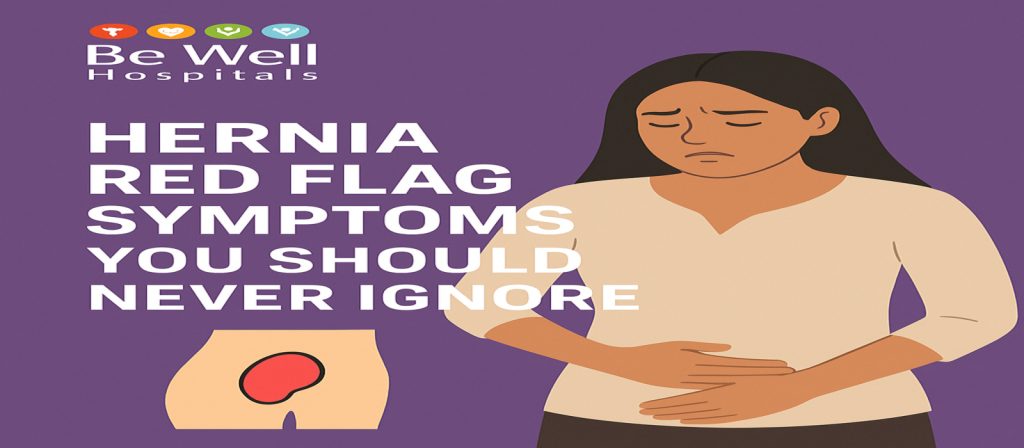
Introduction
A hernia may seem minor, but it’s more serious than many realize. Often starting with mild discomfort or a small bulge, hernias are common across all ages yet frequently underestimated or ignored until they worsen. What begins as a manageable issue can quickly progress into a medical emergency if untreated. Severe pain, sudden swelling, or changes in the bulge can signal life-threatening complications needing immediate attention. Recognizing hernia symptoms early is crucial—not only to ease discomfort but also to prevent dangerous outcomes. This blog highlights key symptoms you should never ignore, their importance, and how timely medical care can protect your health.
What Is a Hernia?
A hernia is a medical condition that occurs when an organ or tissue pushes through a weak spot in the abdominal wall, creating a noticeable bulge. While it may start small, it can become painful and potentially dangerous if left untreated. The common types of hernias include:
- Inguinal hernias, which are more common in men, occur in the groin area.
- Femoral hernias, which are more common in women, are located in the upper thigh or lower groin.
- An umbilical hernia, which typically affects infants but can also affect adults, develops close to the belly button.
- An incisional hernia forms where a prior surgical scar was.
- A hiatal hernia occurs when a portion of the stomach pushes through the diaphragm and into the chest.
Several risk factors increase the chances of developing a hernia, such as obesity, heavy lifting, chronic coughing, pregnancy, prior abdominal surgeries, and aging. Recognizing these risks helps in prevention and early detection.
General Symptoms of a Hernia
- Visible Bulge in Abdomen or Groin: A lump that becomes more noticeable when standing, bending, or coughing is the most common sign of a hernia.
- Dull Ache or Pressure: A constant heaviness, ache, or pressure may be felt at the site of the hernia, which can worsen with activity.
- Discomfort During Movements: Pain or discomfort often occurs while lifting heavy objects, bending forward, or straining, as these actions increase abdominal pressure.
- Burning or Gurgling Sensation: Some people may notice a burning feeling or even a gurgling sound in the affected area as organs or tissues push through the weak spot.
Red Flag Symptoms You Should Never Ignore

- Severe, sudden abdominal or groin pain may indicate a trapped or strangulated hernia that needs emergency treatment.
- A bulge that becomes firm, tender, or discolored is a warning sign of reduced blood flow and potential tissue damage.
- A bowel obstruction caused by the hernia is frequently indicated by nausea, vomiting, or difficulty passing gas or stool.
- Fever accompanied by hernia pain can suggest infection or strangulation, both of which are serious complications.
- Rapidly enlarging swelling is a clear danger signal that the hernia is worsening and requires urgent medical attention.
Why These Symptoms Indicate a Medical Emergency
Certain hernia symptoms should never be ignored because they may point to life-threatening complications. Cutting off the blood supply to the trapped tissue causes a strangulated hernia, which, if left untreated, can rapidly result in tissue death and serious infection.
Similarly, an obstructed hernia happens when a part of the intestine gets blocked, leading to symptoms like vomiting, constipation, abdominal swelling, and intense pain.
Both of these conditions are medical emergencies that cannot be managed with home remedies or watchful waiting—they require urgent surgical intervention to restore normal blood flow, relieve the obstruction, and prevent permanent damage.
Recognizing these symptoms early and seeking immediate medical care can make the difference between a safe recovery and a life-threatening complication.
When to See a Doctor
Knowing when to see a doctor for a hernia is just as important as recognizing emergency symptoms.
Even if there are no immediate red flag signs, persistent pain or swelling in the abdomen or groin should not be ignored, as it indicates the hernia is worsening. If you experience difficulty in pushing the bulge back in, it could mean you have an incarcerated hernia, where the tissue gets trapped and may progress to a strangulated hernia if left untreated.
Additionally, any new or worsening symptoms, such as increased discomfort, changes in the size of the bulge, or digestive issues, are strong reasons to seek medical advice. Early consultation with a healthcare professional can help confirm the diagnosis, prevent complications, and allow timely treatment before the condition becomes dangerous.
How Doctors Diagnose and Treat Emergencies

- Diagnosis: Typically, doctors start with a physical examination to look for any discomfort or bulges. If the diagnosis is unclear, imaging tests like an ultrasound or CT scan may be used to confirm the condition and assess severity.
- Emergency Surgery: In cases of strangulated or obstructed hernias, immediate surgery is performed to restore blood supply, relieve blockage, and prevent life-threatening complications.
- Elective Surgery: For reducible hernias that can be pushed back in, doctors often recommend planned (elective) surgery to prevent future complications and worsening.
- Laparoscopic Hernia Repair: A minimally invasive surgical option where small incisions and a camera are used, offering quicker recovery, less pain, and reduced scarring compared to open surgery.
Preventing Complications from a Hernia
- Avoid heavy straining or lifting, as it increases pressure on the abdominal wall and can worsen an existing hernia or trigger complications.
- To reduce excess strain on the abdomen and lower the risk of hernia progression, maintain a healthy weight.
- Manage chronic cough or constipation with proper treatment, since repeated straining weakens abdominal tissues over time.
- Get regular check-ups if you already have a known hernia, so doctors can monitor changes and recommend timely treatment before emergencies arise.
Conclusion
Don’t ignore the warning signs of a hernia. What starts as a mild bulge or slight discomfort may seem harmless, but sudden severe pain, swelling, or changes in the bulge can become life-threatening if untreated. Immediate medical help at the first sign of red flag symptoms is vital to prevent serious complications. Early diagnosis and timely treatment not only bring relief but also ensure better outcomes and reduce the risk of emergencies.
At Be Well Hospitals, our expert surgical team provides safe, advanced hernia treatments to restore your health. Don’t wait until it’s an emergency—visit our Hernia Treatment page or call 9698 300 300 today to book your appointment.
